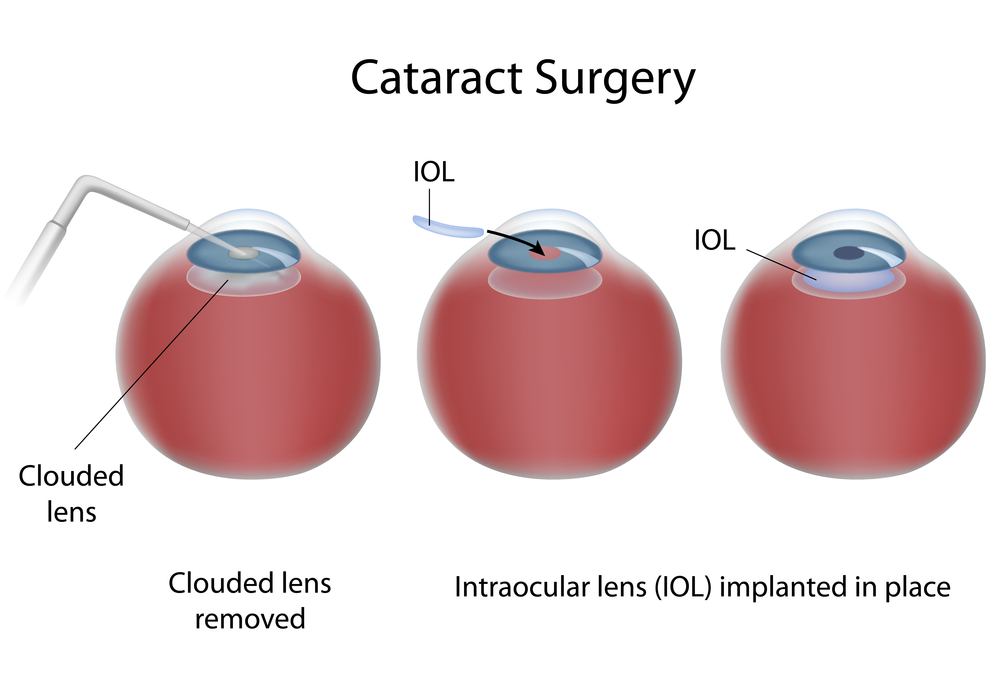Cataracts are one of the most common age-related eye conditions. They typically develop very slowly, making it hard to notice any visual problems initially.
But the more they develop, the more challenging it becomes to see clearly. Patients with advanced cataracts struggle to drive at night and can even have trouble navigating their own homes.
You no longer have to suffer from poor vision if you have advanced cataracts. Cataract surgery can completely restore your vision, sight, and quality of life.
If you choose a premium IOL, you could see better than before cataracts. Keep reading to discover why cataract surgery means being able to drive at night again and much more!
What are Cataracts?

Cataracts form on the eye’s natural lens. Your natural lens should be clear, allowing you to see through it. But it can grow cloudy and interfere with your ability to see clearly.
Cloudy vision is something most people think of as a side effect of simply getting older. However, it’s a sign of having cataracts.
It can take years for cataracts to develop to the point that you notice any visual symptoms. You may have them and not even know it.
This is one reason why it’s essential to schedule eye exams regularly. The earlier your cataracts are diagnosed, the more your eye doctor can monitor their development and help you recognize when they’re causing significant visual problems.
What are the Symptoms of Cataracts?
There are several symptoms of cataracts, including:
- Blurry vision
- Poor night vision
- Halos, glare, and starbursts of light
- Light sensitivity
- Decreased ability to see contrast
Experiencing these symptoms can make it hard to do everyday tasks. Driving at night can be especially dangerous because of poor night vision, and glare from headlights can be blinding.
Patients with advanced cataracts also struggle to see up close without direct light. Not having direct light makes it more challenging to do tasks like reading and cooking.
If you have advanced cataracts, you may be unable to do things for yourself, leaving you dependent on others. You may also inadvertently isolate yourself due to embarrassment over asking for help or simply because you cannot travel alone.
Cataracts can make your life much more challenging and lonely if left untreated. But the good news is you can treat cataracts by having cataract surgery.
What is Cataract Surgery?
Cataract surgery restores all vision lost to cataracts by removing cataracts and your natural lens where they’ve formed. You’ll have your natural lens and the cataract removed.
The natural lens is then replaced by an intraocular lens, or IOL, which helps you see clearly. Because cataracts develop so slowly, the procedure is only recommended once your cataracts begin to affect your quality of life.
But at that point, getting cataract surgery is very important. Patients are often shocked at how well they can see after the procedure because they didn’t realize just how bad their cataracts were until removing them.
If you struggle with your daily tasks due to cataracts, it’s time to consider cataract surgery. Do you find doing dishes, making dinner, or cleaning your house challenging because of impaired vision? These are all signs that the procedure is worth thinking about.
With cataract surgery, you can get your vision back. But there’s a way to improve your vision further during cataract surgery: choosing a premium IOL.
Premium IOLs
There are different types of IOLs that you’ll have to choose from when you decide to have cataract surgery. One option considered “standard” and included with the surgery price is monofocal lenses.
Monofocal lenses have a uniform surface and allow you to see at one distance, either up close or far away. Some people choose monovision, although it is less common.
With monovision, you’ll have one lens put in one eye for seeing up close, and the other is put in your eye for seeing at a distance. This allows you to see well enough between these distances.
But monovision isn’t well-suited for everyone. If you have monofocal IOLs, you’ll still need reading glasses to see up close or prescription glasses to see at a distance.

Another option for those looking for better vision at a broader range of distances is premium IOLs. Premium IOLs have an out-of-pocket cost.
However, they can provide you with much better vision at a broader range of distances. They often reduce or even eliminate the need for other visual aids.
There are also several options to choose from regarding premium IOLs. Here are the kinds we offer at Sugiki Portis Eye Center:
Multifocal Lens
The multifocal lens has alternating sections that switch between two refractive powers. One is for seeing up close, and one is for seeing at a distance.
Your eye is trained to look through the part of the lens that best helps you see what you’re looking at.
Trifocal Lens
The trifocal lens is similar to the multifocal IOL. However, instead of alternating between two refractive powers, it alternates between three: one for up close, one for far away, and one for intermediate distances.
Alternating between three refractive powers allows for clearer vision at arm’s length and a better range of vision overall.
Extended Depth of Focus (EDOF) Lens
The Tecnis Symfony Extended Depth of Focus Lens is similar to a multifocal, but it’s a non-diffractive IOL. That means that the transition between the alternating sections isn’t abrupt.
Instead, the different sections blend together for a smoother transition that lowers the risk of visual aberrations.
Accommodating Lens
An accommodating lens mimics the natural lens in your eye, meaning it changes shape, becoming thicker when you focus on something up close.
Toric and Apthera IC8 Lenses

Toric and Apthera IC8 lenses are two different kinds of lenses that both correct astigmatism. If you want your astigmatism corrected during cataract surgery, either IOL can be a great choice. Your eye doctor can help determine which lens is best for your particular case of astigmatism.
With cataract surgery, you’ll be able to live your life again. If you choose a premium lens, you can do much more and see like never before.
Are you ready for better vision? Request your cataract consultation at Sugiki Portis Eye Center in Honolulu, HI, today!





